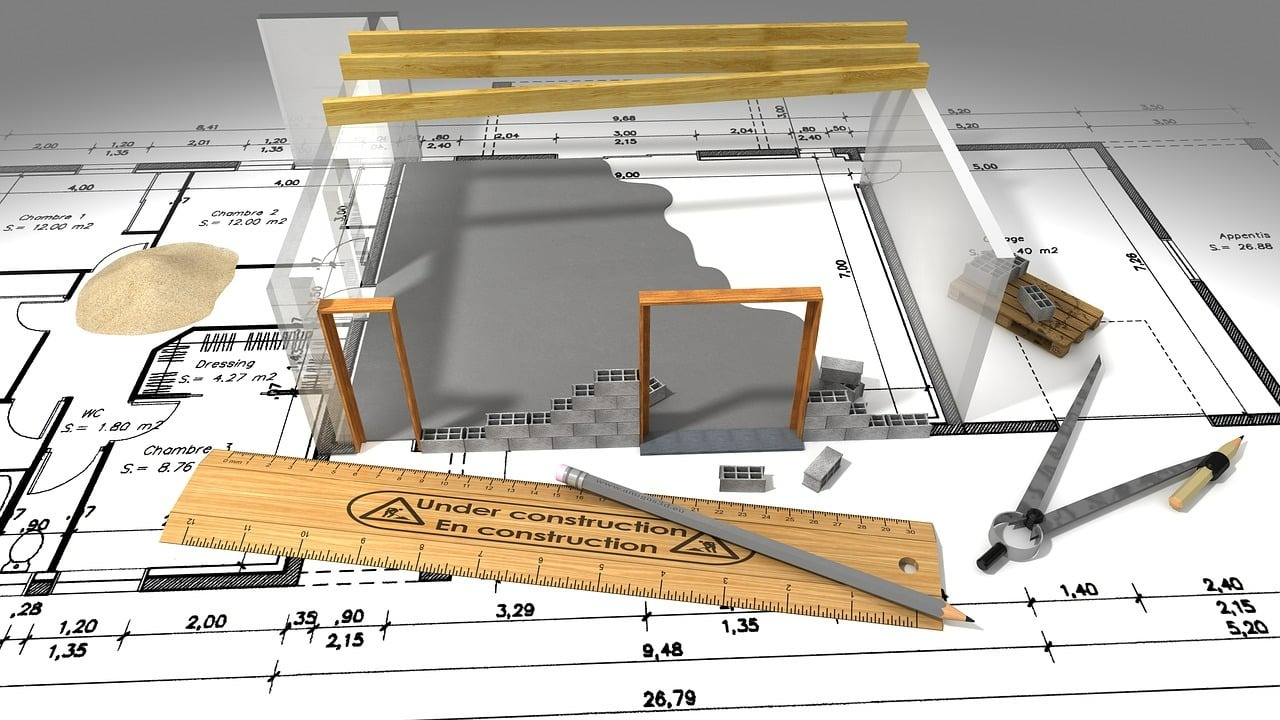Renovating a house is an exciting but costly endeavor. Whether you’re looking to update your kitchen, remodel your bathroom, or completely overhaul your property, understanding home renovation costs is essential. The house renovation price varies depending on the project, whether it’s interior upgrades, structural modifications, or exterior improvements. Given these variations, a whole house renovation cost can quickly add up, so proper budgeting is necessary to avoid unexpected expenses.
If you’re asking yourself, “how much does it cost to renovate a house?”, the answer depends on various factors, including materials, labor, and the scope of work. This guide breaks down these expenses in detail, helping homeowners make informed financial decisions and achieve their dream home within a realistic budget.
Average Home Renovation Cost
Understanding the home renovation cost for different parts of your house can help you allocate your budget more efficiently. Normally, the average price of home renovations for a two-bedroom home is between £45,000 and £150,000. Here’s an overview of estimated costs for two-bedroom home renovations:
| Breakdown costs (for the 2-bedroom house) | Average Price |
|---|---|
| Heating system renovation | £7,000 |
| Full house rewiring | £6,500 |
| Gas supply installation | £1,500 |
| Wall replastering | £2,000-£15,000 (depends on the number of walls) |
| Window replacements | £5,000 (can vary depending on type) |
| Bathroom remodel | £6,000 |
| Kitchen renovation | £12,500-£30,000 |
| Kitchen extension | £25,000 |
| Knocking down walls | £2,500 |
| Loft renovation | £50,000 |
| Garage renovation | £6,000 |
| New roof installation | £4,000-£12,500 |
| Rot repair | £1,500 |
| Woodworm treatment | £400-£800 |
| TOTAL | £107,900-£147,300 |
How Much Does a New Heating System Installation Cost?
Installing a new heating system, including a combi boiler and radiators, can cost around £7,000. This price covers installation fees and any required modifications to the existing pipework for optimal efficiency.
How Much Does a Wall Replastering Cost?
Replastering walls can increase your home remodel cost by up to £15,000, depending on the number of walls that need work.
How Much Does a Window Replacement Cost?
Window replacement may cost around £5,000, but the price varies depending on the type and material.
How Much Does a Bathroom Renovation Cost?
The average cost of bathroom renovation UK varies based on size and materials. Expect to spend between $6,000 and $15,000 for a standard remodel, with high-end renovations exceeding $30,000.
Here’s a breakdown of the bathroom renovation cost UK:
- Bathroom suite: Starts from £1,000 up to £3,000 or more
- Installation: Begins at £7,200
- Old bathroom removal: At least £500
- Tiling, fittings, and finishing touches (including taps, towel rails, and sealing): From £2,000
Additional features like underfloor heating and custom design plans can further increase the cost.
How Much Does a Loft Renovation Cost?
The average cost of a loft conversion is £50,000. Five types of loft conversions are available, ranging from the simplest to the most high-end options. Here’s the breakdown:
1. Room in Loft Conversion (£22,500 – £30,000)
The most cost-effective and straightforward option, this conversion, involves adding windows to the existing roof without altering its structure, creating a usable space with minimal changes.
2. Dormer Loft Conversion (£40,000 – £60,000)
A popular choice for terraced houses, this extension adds a box-shaped structure to the rear of the property, increasing headroom and floor space while maintaining a traditional look.
3. Hip to Gable Loft Conversion (£50,000 – £70,000)
Ideal for semi-detached homes with sloping roofs, this conversion extends the sloping side into a vertical gable wall, maximizing interior space and improving the overall layout of the loft.
4. Mansard Loft Conversion (£50,000 – £80,000)
A more extensive renovation, this conversion alters the roof angle to create a nearly vertical back wall, providing significant additional space. It is often used in areas with strict planning regulations where dormer conversions are not allowed.
5. Bungalow Loft Conversion (£62,500 – £87,500)
Suitable for bungalows with the proper structural conditions, this type of conversion adapts any of the above styles to transform the loft into a fully functional living area, subject to planning approval.
How Much Does a Kitchen Renovation Cost?
Kitchen renovations can be expensive due to cabinetry, appliances, and countertops. A minor update may cost $10,000 to $25,000, while a complete remodel could exceed $50,000. The kitchen renovation cost can increase if you choose expensive tiles and marble countertops.
How Much Does a Garage Conversion Cost?
The cost of converting a garage depends on its size and the type of room being created. Below are estimated costs:
| Conversion Type | Garage Size | Estimated Cost |
|---|---|---|
| Integral Conversion | Single | £13,000 – £18,000 |
| Double | £27,000 – £36,000 | |
| Kitchen Conversion | Single/Double | £10,000 – £20,000 |
| Bathroom Conversion | Single/Double | £2,700 – £7,000 |
| Living Room Conversion | Single/Double | £6,000 – £7,000 |
| Full Double Conversion | Double | £27,000 – £36,000 |
Costs may vary based on materials, labor, and any additional structural work needed.
How Much Does an Extension Cost?
The cost of an extension varies based on size and finish. Below is a breakdown of estimated costs for different extension sizes.
| Extension Size | Mid-Range Cost | Luxury Cost |
|---|---|---|
| Small (20 sqm) | £30,000 – £44,000 | £46,000 – £50,000 |
| Medium (30 sqm) | £45,000 – £66,000 | £69,000 – £75,000 |
| Large (50 sqm) | £75,000 – £90,000 | £110,000 – £125,000 |
Home Remodel Cost: Labor & Materials
When estimating house refurbishment costs, consider the following components:
1. Labor Cost
Labor costs encompass the wages paid to professionals such as builders, electricians, plumbers, and decorators, and they can fluctuate significantly over time based on location, the time of year, and the complexity of the work.
In London, estimated daily rates include:
- Building Contractors: £200
- Painters and Decorators: £150
- Electricians: £350
- Plumbers: £350
- Roofers: £245
It’s advisable to obtain multiple quotes and check references to ensure you’re hiring qualified and reliable tradespeople.
2. Material Cost
Material costs include all the necessary items for the renovation, such as lumber, tiles, fixtures, and paint, typically accounting for around 40% of the house remodel cost. Prices can fluctuate based on quality, brand, and market conditions, meaning your material choices will heavily influence overall spending.
Sourcing materials during sales or from wholesale suppliers can lead to significant savings, while reusing or upcycling existing materials offers a cost-effective alternative.
Hidden Costs of Renovating a House
Beyond construction and decorating, there are extra costs to consider.
- Surveys & Planning Fees – Structural work or extensions may require surveys and planning applications, and the cost increases as the project grows in size.
- Stamp Duty & Legal Fees – If buying a property to renovate, factor in solicitor costs and stamp duty, which is higher for second homes. Selling your first home within 36 months may qualify you for a refund.
- Temporary Housing Costs – Extensive renovations may make your home unlivable, requiring you to rent temporary accommodation. If you’re looking for an affordable and hassle-free temporary home while renovating, explore various short-stay properties with flexible lease terms at uhomes.com.
How Long Does It Take to Renovate a House?
The time needed for a complete house renovation depends on its scale and complexity. For a smaller size house, the remodel period can take 4 to 7 months. For a larger house, the entire redo can take 9 to 15 months. If there only involves minor remodelling, such as painting, plastering, decorating, you can expect the process to be just a few weeks. For a more accurate timeline, you’d better consult local renovation experts.

Should You Renovate or Move?
Whether to do a whole house renovation or move depends on your needs and budget. One thing that should be clear is home renovation doesn’t always add value to your house. You can have a quick comparison of renovating and moving to help you decide:
Benefits of Renovating
- Costs Less – House renovations are often cheaper than buying a new home, and you can spread expenses over time.
- Personalize Your Space – No compromises, design your home or extend your spaces exactly how you want.
- Stay in Your Area – Stay in your home and familiar neighborhood. No need to adjust to a new neighborhood, commute, or lifestyle.
Benefits of Moving
- Fresh Start – Move to a better location, closer to work or schools.
- No Construction Hassle – Avoid the stress of living in a building site.
- Lower Costs by Downsizing – If you move to a smaller home, you can reduce mortgage payments, utility bills, and maintenance costs.
Consider your priorities and budget to make the best choice for you!
Factors Influencing Home Renovation Costs
Several factors affect house renovation prices, including:
- Property Size – A full house renovation cost more due to increased materials, labor, and time.
- Location – Urban areas have higher house refurbishment costs due to labor demand and material prices, while rural areas may have fewer options but lower fees.
- Age & Condition – Older homes often need costly repairs, such as wiring, plumbing, or structural fixes.
- Renovation Complexity – Simple updates cost less, while structural changes require permits, specialists, and higher expenses.
- Material Quality – Premium materials like hardwood or granite increase renovation cost per square foot, while budget options help save money.
- Finishes & Fixtures – High-end lighting, furniture, and décor add to expenses, while standard fittings keep costs down.
- Available Space – Expanding a home requires extra materials, labor, and permits, raising overall costs.
How to Calculate Whole House Renovation Cost?
Accurately calculating full house renovation costs involves detailed planning and consultation like these:
1. List All Renovation Tasks
Start by making a comprehensive list of all the work that needs to be done, including structural changes, electrical work, plumbing, flooring, painting, and furniture installation. A clear outline ensures that you account for every aspect of the project.
2. Get Quotes from Contractors
Get at least three quotes from contractors to compare prices. Different professionals charge varying rates, so selecting an experienced yet affordable contractor is key to managing costs effectively.
3. Include a Contingency Fund
Allocate 10-15% of the total budget to cover unexpected expenses during the renovation process.
4. Compile Data into a Spreadsheet
Organizing your estimated expenses into a spreadsheet can help track costs more efficiently, allowing you to monitor spending and adjust your budget accordingly.
5. Consult a Professional for an Accurate Estimate
For precise calculations, consult a construction expert, architect, or renovation specialist. They can provide insights into potential hidden costs, labor fees, and material expenses that may not be initially apparent.
When Do I Need an Architect?
Hire an architect for major structural changes like extensions or layout alterations. They ensure proper planning, design, and compliance with building regulations.
For minor work without major structural changes, a structural engineer or experienced builder may be enough.
Architect fees typically range from 10% to 15% of construction costs, but for complex designs, they can go up to 20%. Some offer fixed or hourly rates for simpler projects.

Managing Your Renovation Costs Effectively
Managing your house renovation costs requires meticulous planning and informed decision-making. Here are several strategies to help you stay within budget:
- Plan Thoroughly – Outline every detail of your renovation to avoid unexpected costs and delays.
- Create a Detailed Budget – List all expenses, including materials, labor, and permits, and add a 10-15% contingency for surprises.
- Prioritize Essential Renovations – Focus on necessary upgrades that improve safety and functionality before aesthetic changes.
- Understand Permit Costs – Check with your local council for required permits and fees to avoid legal issues.
- Hire Qualified Professionals – Choose experienced tradespeople to prevent costly mistakes and ensure quality work.
- Compare Prices – Shop around for competitive rates on materials and labor to get the best value.
By implementing these strategies, you can manage your home renovation project efficiently, ensuring it aligns with your budget and lifestyle needs.
Conclusion
Understanding how much does it cost to renovate a house is crucial for financial planning. House renovation costs vary based on the property size, materials, labor, and project scope. To estimate how much to renovate a house, outline your project, compare material prices, and consult professionals. Moreover, setting aside a contingency budget helps manage unexpected expenses.
Whether upgrading one, two, or three bedrooms or remodeling your entire home, estimating home remodel costs helps you achieve the best results within your budget without unnecessary financial strain!
FAQs
Homeowners renovate for various reasons, including improving property value, enhancing aesthetics, fixing structural issues, or upgrading outdated features.
A budget of 50k may cover minor to mid-range renovations, but a whole house renovation cost might require a higher budget, depending on the project scale.
Labor and structural changes typically account for the highest expenses. Kitchens and bathrooms also contribute to high renovation costs due to plumbing and electrical work.
Remodeling a home is generally cheaper than buying a new one. Selling and buying a new property include realtor fees and closing costs, which add significantly to the total price compared to the cost of renovating an existing home. However, the exact cost depends on the size of the renovation and the specific features you want to redo. Some projects may require more extensive renovations than initially anticipated, which can affect the overall cost.







